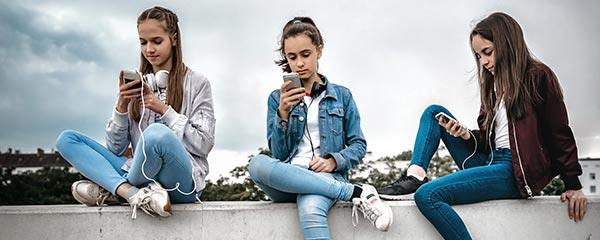Story Highlights
- High social media use predicts higher rate of poor mental health
- Strong parenting relationship predicts lower mental health risks for teens
- Effect of strong relationship holds even among heavy social media users
WASHINGTON, D.C. -- Teenagers who spend more time on social media experience worse mental health on a variety of measures, according to data from a new ║┌┴¤═° survey.
Yet, the strength of the relationship between an adolescent and their parent is much more closely related to their mental health than their social media habits. When teens report having a strong, loving relationship with their parents or caretakers, their level of social media use no longer predicts mental health problems.
The data inform debates about the consequences of social media use.
Heavy Teen Social Media Use Corresponds With Greater Negative Emotions
These findings are from a June 26-July 17 Familial and Adolescent Health Survey conducted using the ║┌┴¤═° Panel. Responses from 6,643 parents living with children between the ages of 3 and 19 were included in the survey about mental health and parenting, and 1,591 of the adolescents living with those parents also completed a questionnaire about their mental health, relationships and activities. This survey estimates that U.S. teens spend an average of 4.8 hours per day across seven popular social media apps.
Teens were asked whether they experienced a lot of sadness the day before the survey, as well as other negative emotions. They were also asked to rate their overall mental health, with responses of “very poor” or “poor” coded as showing mental health problems. Parents were asked the same overall item about their teen, as well as two additional items about symptoms of depression and anxiety -- measured as how often their child has seemed down, depressed or hopeless and how often they have seemed nervous, anxious or on edge. Children were coded as having symptoms of depression or anxiety if their parent reported that these symptoms appeared regularly or all the time over the past 12 months.
Among teens, 37% report spending five or more hours per day on the seven social media apps, 14% report spending four to less than five hours, 26% report spending two to less than four hours, and 23% report spending less than two hours. Using these categories, higher social media use predicts a significantly higher risk of mental health problems across eight outcomes tested.
Teens who spend five or more hours per day on social media apps are significantly more likely to report experiencing negative emotions compared with those who spend less than two hours per day.
For example, 26% of teens who routinely spend at least five hours per day on social media report feeling a lot of sadness “yesterday,” compared with 19% of those who spend less than two hours on social media. When it comes to experiencing daily anger, the gap is even wider: 25% of teens who spend at least five hours on social media report feeling a lot of anger, versus 14% of those who spend less than two hours.
This pattern is also found in overall mental health assessments reported by both teens and parents. Forty-one percent of teens rate their mental health as poor or very poor if they use social media for five or more hours per day, compared with 23% of those spending less than two hours per day who say the same. Using parental reports of their teens’ mental health yields a similar relationship, though a smaller gap. Among teens who spend at least five hours on social media, 28% of parents report their teen’s mental health as poor or very poor, compared with 22% of parents whose teens use social media less than two hours per day.
Parents of heavy users of social media are also more likely to report frequent symptoms of depression and anxiety among their teenage children.
║┌┴¤═° also collected data on parents’ reports of suicidality and self-harm for their adolescent child and current and future wellbeing data directly from the adolescent. These items and those mentioned above were combined into a comprehensive mental health index, described in more detail in a ║┌┴¤═° co-published with the Institute for Family Studies. This index is coded on a standardized scale, where the mean is zero and the standard deviation is one. The results show that teens who spend five or more hours per day score -0.08 standard deviations below the mean on mental health and those who spend under two hours score 0.26 standard deviations above the mean. As noted in that report, the negative effects associated with the comprehensive mental health index seem to be found for YouTube and TikTok but none of the other five apps tested, which included Facebook, Twitter, Instagram, WeChat and WhatsApp.
Mental Health Outcomes Worse for Teens With Weak Parental Relationships
The survey also included a summary item asking teens to rate their relationship with their parent or caretaker on a zero-to-10 scale, where zero is the weakest and least loving relationship they can imagine and 10 is the strongest and most loving. Seventy percent of teens rate the relationship as an 8 or higher, which is classified as strong for the purposes of this analysis.
As ║┌┴¤═° previously reported, the strength of the parent relationship -- in addition to parental supervision and regulation of screen time -- predicts much less time spent on social media.
Across all categories of social media use, mental health outcomes are much worse for teens who report a weak parental relationship than those who report a strong one. The comprehensive mental health index shows a high of -23 and a low of -59 for teens with a weak parental relationship. By contrast, the index varies from 26 to 39 for those with a strong parental relationship.
Looking only within the group of teens with a strong parenting relationship, the comprehensive mental health index is not significantly different for those who use social media for five or more hours compared with those who use it for less than two hours. The same is true when the analysis is done for those with a weak parenting relationship.
More broadly, only three of the 16 outcomes tested show significant gaps across social media use. These include youth-reported overall mental health (for both groups) and feelings of anger among teens with a weak relationship. Otherwise, the data suggest that mental health outcomes are similar for high and low users of social media among youth with a strong parental relationship and among youth with a weak relationship.
Bottom Line
U.S. public health agencies and scholars have in recent years, leading .
Consistent with the on the topic, the ║┌┴¤═° survey confirms that mental health problems are more severe among heavy adolescent users of social media. Yet, these data also suggest that the strength of the parenting relationship shows a more fundamental connection to mental health and that teens who benefit from a strong, loving relationship with their caretaker are much less likely to be harmed by intensive social media use than those who do not.
These findings do not constitute a thorough analysis of the complex causal pathways that link mental health to social media use and other behaviors, but they provide additional evidence to inform parents, technology companies and other interested parties of the potential effects.
To stay up to date with the latest ║┌┴¤═° ║┌┴¤═° insights and updates, .
Learn more about how the works.




